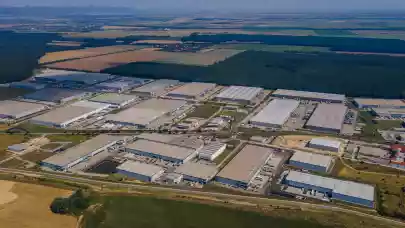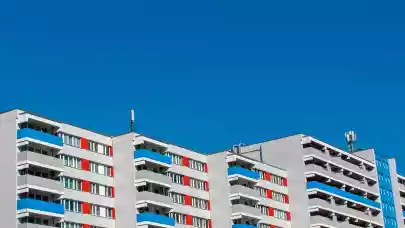
Ádám Ambrus, Manager of Amera Grup, talked to Property Forum about the company's ongoing investment of €7 million in the first Accor-branded hotel in Cluj-Napoca and the trends shaping new investments in the city.
This interview was first published in Property Forum’s annual listing of "The 50 most influential people in Romania’s real estate market”.
How did you create the Nervia investment funds and what volumes of real estate assets did you manage?
My journey started in Spain, quite literally, in the orchards picking apples. It was my first experience abroad, and it taught me humility and resilience. After learning the language, I got a job at ACE (now Fujikura), where I quickly found my footing. Within just three years, I returned to Cluj as the CEO of the company's Romanian operations. Leading a 3,000-employee automotive factory and delivering products to global clients like Volkswagen, Audi, Škoda, and SEAT was a huge leap - and a turning point that defined my business mindset. It was an intense and transformative period that taught me how to manage complex business operations, lead large teams, and deliver at the highest standards of the automotive industry. After that, I built two Spanish investment funds under the Nervia brand, managing almost €100 million of real estate assets as Country Head for Romania. Nervia developed four industrial parks and created long-term value for over 200 hectares of land, with developments in Cluj, Arad, Bihor, Timiş, and Bucharest. We focused on building sustainable, strategically positioned projects and establishing professional asset management in a fast-growing market.
What project by Nervia stands out in your portfolio?
The Nervia Industrial Park in Apahida, near Cluj-Napoca, is the project I am most proud of. It's a 25-hectare industrial park, out of which we developed 30,000 sqm of modern logistics and industrial space. We attracted major international and local tenants by focusing on flexibility, infrastructure quality, and location. Thanks to its strategic positioning near the city, the airport, and national transport corridors, the park became a key reference point in the industrial real estate market of the region.
Amera Tower is the first office building in Cluj-Napoca to achieve the zero-waste certificate. How did this impact tenants' lives and the environment?
To achieve this certificate, we had to reduce the waste produced by 90%. It was mostly about education and awareness. At peak occupancy, we had around 800 employees in the building, so we didn't just educate and engage 800 individuals - we indirectly involved 800 households as well. The transition was surprisingly smooth - within a few months, employees even started bringing problematic waste from home, like used batteries and cooking oil, because they knew we would handle it responsibly. It created a real sense of shared purpose in the building. More than just a certificate, it became a culture shift that engaged the entire community working in Amera Tower
How do Amera Tower's green building features contribute to sustainability, and how does this resonate with your tenants' priorities?
Amera Tower was the first green building in Cluj-Napoca, achieving LEED Gold certification back in 2012 - a pioneering step at that time. Today, ESG compliance is a major priority for corporations, and Amera Tower's green features - energy efficiency, waste management, and integrated recycling systems - align perfectly with our tenants' goals. These features not only reduce operational costs and environmental impact but also help tenants meet their sustainability targets and reporting obligations. By helping them meet their ESG commitments, we increase tenant satisfaction and loyalty, while contributing to a healthier urban environment.
Amera Tower is the first office building in Cluj-Napoca to achieve the WELL Health and Safety Rating. How has this certification impacted tenant well-being and the project's appeal?
We started working on the WELL Health and Safety certification during COVID-19 to ensure the safest and healthiest conditions possible for our clients. We prioritized this because we understood the importance of giving people the confidence to return to the office. We invested in air quality improvements, contactless systems, and sanitation protocols. These efforts helped our tenants attract employees back into a collaborative and secure environment.
How did you decide to expand your portfolio into the hotel segment, and what is the potential for hospitality in Cluj-Napoca?
After the rise of home office trends, we decided to repurpose some of our parking facilities. We reconverted two plots, totalling nearly 200 parking spaces, and one became the future hotel site. In 2020, we conducted a general hotel market research with Horwath HTL, and in 2021, a site-specific study confirmed a strong opportunity. We realized there was a clear gap in the international three-star hotel segment in Cluj-Napoca, with only Hampton by Hilton present at that time. With growing business and tourism traffic in the city, we saw untapped potential in offering branded mid-scale accommodations with strong loyalty programs and predictable quality.
Entering the hotel sector was a strategic move, based on clear market research. After consulting both international and local experts, we identified two or three strong brand options. We chose Accor for their flexibility and our positive past experiences with Ibis.
The Ibis Styles brand offered the right balance of individuality, global standards, and affordability. We have been working on the project for almost five years, and we plan to open in the first half of 2027. The investment value is estimated at around €7 million. It will be the first Accor-branded hotel in Cluj-Napoca, which we believe is a strong addition to the city's hospitality offering.
What are some of Cluj-Napoca's strong points for new commercial property investments?
Cluj-Napoca remains a very safe bet. The city's purchasing power is already high and continues to grow, it has a young, educated population, a thriving tech scene, and major infrastructure investments underway. Depending on how you manage land acquisition and authorization, you can achieve very attractive yields. However, if you buy already-leased properties, expect to pay a premium, which can lower your return significantly. That's why value creation through development remains our core strategy.
What is your outlook for property investment transactions in Romania during 2025?
I believe 2025 will be a very good year for building projects. If major developments like the two mega malls Rivus and Sanex, the regional hospital, the subway, and new infrastructure projects (like the ring road) all start, construction capacity will become extremely limited. Prices will rise, and availability will shrink, so getting ahead of this wave will be crucial. Developers who prepare in 2025 will be in the best position to deliver in 2026-2027, when demand is likely to accelerate even more.



